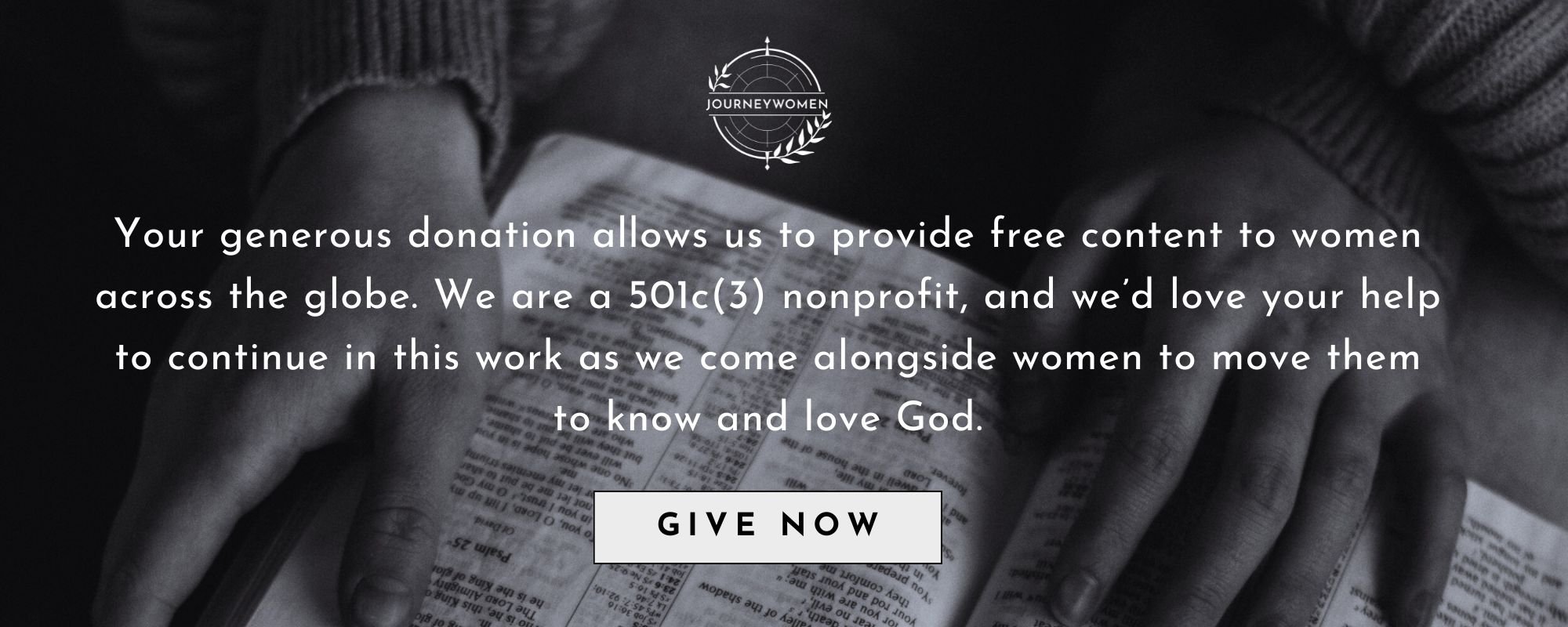Shame with Abbey Wedgeworth
On today’s episode of the Journeywomen podcast, I chatted with my friend Abbey Wedgeworth about shame. We ran the gamut on the topic of shame, moving from questions we can ask ourselves to determine whether or not we are functioning in shame, to how the gospel actually addresses shame. Listen to what she said: “In the life, death, and resurrection of Jesus we see that God is faithful to us because of his love. Not because we’re worthy. So he loves us not because we’re lovable, but we are made lovely because he sets his love on us. He makes us beautiful. In exchange for our shame he offers acceptance, honor, worth, and even glory.” Whew! If you don’t walk away from this episode encouraged, I cannot help you. So you’ll know her a little better, Abbey is a wife, mother, and nap-time writer living in Hilton Head Island, South Carolina. She is passionate about helping young moms apply the riches of Christ to the realities of motherhood. You can find her writing on her blog, Risen Motherhood, Unlocking the Bible, and The Gospel Coalition.
I think you now know why I like being friends with Abbey. She has a genuine understanding of the gospel and how it intersects with everyday life and I, personally, want to be like that. If you want to talk more about the topic of shame--and I really think you will, because Abbey is helping us with some of our Instagram content this week-- you can hop over to @journeywomenpodcast on Instagram or Facebook.
Can you tell us a little about who you are and what you do?
Why is shame an important topic for us to consider?
What is shame? What's the opposite of shame? Is shame always negative?
Where did shame originate? How does it affect us?
Do you have any diagnostic questions we might ask ourselves to determine whether or not we're functioning in shame?
What is the world's remedy for shame? What is the Word's remedy for shame?
How does the gospel address shame?
How does understanding how the gospel addresses shame change us?
How can we take hold of God's remedy for destructive shame?
Biblically speaking, what ought we do when we detect that we have been walking in shame?
THREE QUESTIONS I ASK EVERY GUEST
What 3 resources would you recommend for someone who wants to grow in this area?
What are your 3 simple joys?
Who has had the greatest impact on your own journey with Jesus?
NOTEWORTHY QUOTES
“After the fall, shame is a part of our human condition. The story of the scripture is about undoing shame. There is so much value in identifying it so that we can seek and receive the remedy for it.”
“Some of us may experience more shame and seeing it reveals the opportunity to experience hope that we never thought was possible.”
“Where guilt says I did something wrong, shame says something is wrong with me. I am what’s wrong. I am unacceptable before others. Shame lives in community and is experienced in relationships.”
“Shame is the feeling that I am contaminated and unacceptable. The opposite of shame is cleansing and honor and acceptance.”
“In the Old Testament, we first see the word unclean in the Levitical law. God puts in place rituals and rules that are offered to keep clean and unclean separate. In the New Testament, the sacrifices that were provided are no longer necessary because of Christ. He is the ultimate sacrifice creating a way for us to have unlimited access to God.”
“Our association with Adam makes us creatures of shame. But our association with God through the provision of Jesus is the cure for our shame. So he makes us acceptable before God, and that is what makes us lovable and acceptable.”
“In the life, death, and resurrection of Jesus we see that God is faithful to us because of his love. Not because we’re worthy. So he loves us not because we’re lovable, but we are made lovely because he sets his love on us. He makes us beautiful. In exchange for our shame he offers acceptance, honor, worth, and even glory.”
“When we hide ourselves in Christ, our humiliation becomes humility. Instead of being destructive it opens us up to others and makes repentance and hearing the father’s words more accessible.”
“From a sinner to sinner perspective, how can I look at my toddler and say ‘how are you still struggling with that?”
“We all have to repent from idolatry. What things have we turned to that are not God to cope with feeling unclean and separate? That is what we lay before him. This is where I tried to remedy myself and my situation. Instead I want God to fix it.”
ABBEY'S RESOURCES FOR SHAME
Shame Interrupted by Ed Welch
Uncovering Shame and Guilt Curriculum by Christian Counseling and Educational Foundation
Reading the New Testament and observing the life of Jesus
The Book of Isaiah
Christian Counseling
Community
ABBEY'S SIMPLE JOYS
Being around water
Eating an afternoon popsicle in a lawn chair with my son
Free Hoopla Audiobooks
IMPORTANT NOTE
Journeywomen interviews are intended to serve as a springboard for continued study in the context of your local church. While we carefully select guests each week, interviews do not imply Journeywomen's endorsement of all writings and positions of the interviewee or any other resources mentioned.
Affiliate links used are used where appropriate. Thank you for supporting the products that support Journeywomen!
FOR MORE OF JOURNEYWOMEN
Subscribe: Apple Podcasts | Spotify
Follow Us: Instagram | Facebook
Support the podcast by writing a review

